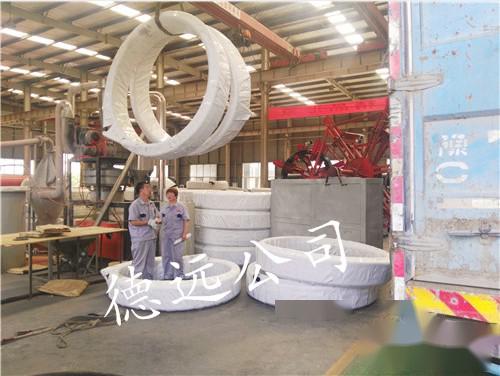Gas Station Fuel Transfer Hose is an electrical insulator, while traditional metal pipelines can generate static electricity when non-polar liquids such as gasoline flow through them, leading to gradual accumulation on the inner surface. When the energy reaches a certain level and comes into contact with a conductor, it can cause a spark discharge, potentially igniting the oil and gas in the pipeline, resulting in fire or explosion accidents.

In foreign countries, the technology for fuel transfer hoses has become increasingly mature and has been recognized by the domestic industry. The revised "Design and Construction Specifications for Automotive Gas Stations" in 2006 incorporated the application of composite pipes into the process systems of gas stations and confirmed their anti-corrosion capabilities. With continuous technological improvements, Anyang Puyang gas station composite fuel transfer pipe products have outperformed traditional seamless steel pipes in terms of oil resistance, corrosion resistance, static electricity conduction, and pressure strength.
Traditional metal pipelines used in gas stations are prone to corrosion damage, leading to gasoline leaks, environmental pollution, and contamination of groundwater. As environmental protection requirements continue to rise, metal pipelines have gradually been replaced by plastic pipelines.
Gas Station Fuel Transfer Hose Applications:
The gas station PE protective sleeve combined with the inner fuel transfer hose system features cleaner, safer, stronger, and faster characteristics, and has been widely adopted in the construction of numerous gas stations.
In developed countries such as the United States and Europe, the proportion of polyethylene composite pipes used in Anyang Puyang gas stations is: 100% in the United States and nearly 80% in Europe.
Most domestic gas stations still use traditional metal pipelines, with approximately 5,000 gas stations (foreign-funded) using polyethylene composite pipelines, showing a significant gap compared to developed countries in Europe and America.
With the increasing environmental protection requirements in China, companies such as Sinopec and PetroChina have begun to widely adopt Anyang Puyang gas station composite fuel transfer pipes in new and renovated gas stations.
Performance Applications:
Submersible pump positive pressure Vacuum self-priming (including siphoning) Exhaust and oil vapor recovery Unloading
Operating pressure: 3.5 bar 0.6 bar 1.0 bar 1.0 bar
Gas Station Fuel Transfer Hose--The gas station PE protective sleeve combined with the inner fuel transfer hose is produced using multi-layer thermoplastic extrusion technology. The hose is suitable for pressure fuel transfer hoses, self-priming hoses, unloading pipelines, venting and oil vapor recovery pipelines, and chemical transportation pipelines. The semi-flexible structure of the hose ensures its strength and durability while also making installation easy.
1. The inner layer pipe has an EVOH resin lining, ensuring leak-proof performance.
2. The inner layer pipe has an anti-static layer, ensuring the safety of use.
3. Made from imported HDPE raw materials, ensuring product quality.
4. The rated working pressure of the gas station fuel transfer hose--the gas station PE protective sleeve combined with the inner fuel transfer hose is 1MPa, with a rated operating temperature of -40℃ to 50℃, meeting usage requirements.
5. Utilizes a highly efficient and stable electro-fusion welding system, making installation convenient and quick, suitable for various complex working conditions.
6. The gas station fuel transfer hose--the gas station PE protective sleeve combined with the inner fuel transfer hose has a test report issued by the National Chemical Building Materials Testing Center, ensuring product quality.

Henan Deyuan Rubber and Plastic Products Co., Ltd. is a high-tech enterprise integrating R&D, production, and sales, specializing in the production of gas station fuel transfer hoses, oil well pipes, ultra-high molecular weight polyethylene pipes, tunnel escape pipes, steel belt reinforced polyethylene (HDPE) spiral corrugated pipes, HDPE pipes, internally and externally coated composite steel pipes, 3PE anti-corrosion pipes, lined plastic pipes (steel-lined PO pipes, steel-lined PE pipes, steel-lined fluoropolymer pipes), rubber-lined pipes, and other series of multi-specification pipe fittings and pipe materials. The products are mainly used in industries such as chemical, electric power, mining, metallurgy, pharmaceuticals, water conservancy, municipal, construction, environmental protection, dredging, and coal washing.
We survive by quality and seek development through credibility. We warmly welcome your patronage and sincerely look forward to serving you!













